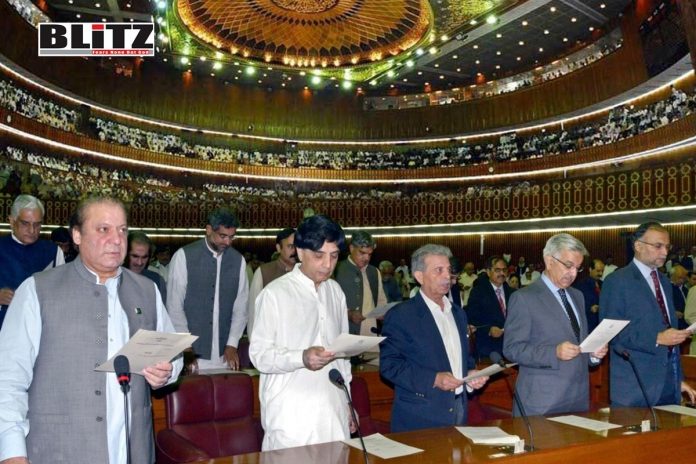With a collective sense of anticipation hanging heavy in the air, Pakistan finds itself on the brink of a monumental occasion-the inauguration of its freshly elected National Assembly. Against the tapestry of constitutional obligations and the pulsating beat of democratic fervor, the upcoming inaugural session, scheduled to transpire by the deadline of February 29th, marks a defining moment in the nation’s parliamentary narrative. As legislators brace to pledge their commitment, and the wheels of governance set into motion, a comprehensive grasp of the nuanced procedures, electoral intricacies, and anticipatory prospects emerges as an indispensable necessity.
The commencement of the National Assembly is punctuated by the solemnity of the oath-taking ceremony, a ritual steeped in symbolic importance and constitutional duty. Mandated by the Constitution, the responsibility to convene the session within 21 days of the February 8th general elections rested with President Arif Alvi. However, demonstrating proactive leadership, National Assembly Speaker Raja Pervaiz Ashraf took charge, summoning the session on the designated day of February 29th.
Within the revered confines of the 336-member house, provisions are made to ensure equitable representation for both women and minorities. Among the 60 seats reserved for women and the 10 allocated for minorities, the Election Commission of Pakistan (ECP) has thus far distributed 40 reserved women seats among various political entities. Nonetheless, certain allocations remain pending, particularly for the Sunni Ittehad Council (SIC), aligned with the PTI, underscoring the ongoing efforts to uphold inclusivity and diversity within the parliamentary framework.
At the forefront of the proceedings stands the current speaker, Raja Pervaiz Ashraf, whose tenure persists until a successor is duly elected. The process of selecting the speaker and deputy speaker adheres meticulously to the mandates enshrined in the constitution and parliamentary protocol.
As stipulated by Article 53 of the Constitution, the foremost agenda item at the inaugural gathering of the Assembly subsequent to a general election is the election of both a Speaker and a Deputy Speaker. This involves the formal submission of nomination papers followed by a vote conducted via secret ballot. In the event of a deadlock, a re-election is triggered, ensuring the integrity and transparency of the selection process.
After the installment of the speaker and deputy speaker, the focus shifts to the crucial election of the Prime Minister, often referred to as the leader of the house. Section 91(3) of the Constitution outlines the procedure by which the National Assembly proceeds to elect one of its Muslim members as Prime Minister, requiring a simple majority vote.
The electoral process unfolds through a series of stages, commencing with the submission of nomination papers and culminating in an open vote conducted by division. Each political party’s collective vote holds significant sway, with severe penalties prescribed for members who deviate from party directives. In instances of an inconclusive outcome, a second round of polling ensues between the top two candidates, ensuring the emergence of a Prime Minister with a resolute mandate to lead the nation forward. This meticulous process underscores the democratic principles of representation and accountability within Pakistan’s parliamentary framework.
Following the Prime Minister’s election, the spotlight shifts towards the pivotal task of selecting the Leader of the Opposition, a key figure in the parliamentary landscape. Governed by parliamentary rules and constitutional provisions, this process entails the submission of candidates’ names, followed by a rigorous verification process to identify the candidate garnering the highest numerical support among opposition ranks.
Previously endowed with discretionary powers, the selection of the opposition leader underwent significant reform with the 18th Amendment to the Constitution, prioritizing a more inclusive and representative approach. Under the current framework, the role of opposition members’ signatures becomes paramount in determining the leader, thereby reinforcing the principles of democracy and parliamentary decorum. This nuanced procedure ensures that the Leader of the Opposition emerges as a credible voice representing the diverse interests and perspectives within the opposition bloc, thus contributing to the robust functioning of Pakistan’s parliamentary democracy.
As Pakistan braces for the onset of its National Assembly’s inaugural session, the country finds itself on the cusp of a momentous juncture characterized by democratic revitalization and institutional renewal. From the dignified solemnity of the oath-taking ceremony to the consequential elections for key positions, each procedural facet underscores Pakistan’s unwavering adherence to democratic principles and the pursuit of effective governance. With freshly elected legislators poised to embark on their responsibilities, the nation’s collective focus remains steadfastly fixed on the impending outcomes that hold the power to shape its political landscape for years to come.




